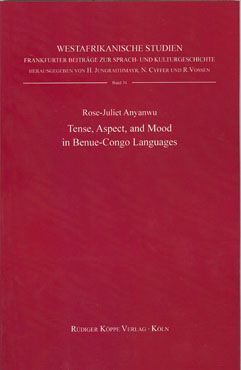
Tense, Aspect, and Mood in Benue-Congo Languages
Author: Rose-Juliet Anyanwu. Series edited by: Herrmann Jungraithmayr, Norbert Cyffer, Rainer Voßen.
Series: WeStu Westafrikanische Studien Volume 34
2010116 pp.
2 graphs, 7 tables, index
Text language(s): English
Format: 160 x 240 mm
240 g
Paperback
€ 34.80
Buy 'Tense, Aspect, and Mood in Benue-Congo Languages' as a downloadable PDF document directly from our online shop »
Order 'Tense, Aspect, and Mood in Benue-Congo Languages' as print edition »
The present work examines TAM in Benue-Congo (henceforth, B-C) languages, without Bantu. The motivation for this project stems partly from the long-standing thesis as formulated, for example by Comrie (1976) who claims that generally aspect is more relevant than tense in the majority of African languages. The following languages are at the centre of the investigation: Hone, Igbo, Kana, and Yoruba, all – according to Blench & Williamson (2000) – belong to the B-C language family.
As part of the methodology, the present study plans to consider (where applicable) the future/non-future and past tenses in relation to the imperfective and perfective aspects. The goal of this project is manifold: primarily to examine, compare, contrast and document the TAM systems of B-C languages minus Narrow-Bantu, secondly to analyse the extent to which TAM interacts with other phenomena, such as tonology, morphology, syntax and also focus arrangements, thirdly to study to what degree each of the following TAM components – tense, aspect, and modality – are important to the B-C languages, and finally to determine whether or not, and to what extent the notion of Aktionsart, also applies to the languages under consideration.
This study shows that aspect is grammatically prominent in the majority of the languages described here. Igbo marks both past and future tenses formally. The Hone verb system marks tense only marginally, viz. perfect and future tenses. Kana marks only future tenses. The Yoruba verb system does not mark any tense. All the “future” markers in this language are indeed modal, and not tense. Concerning present tense, cross-linguistically, there seems to be a tendency on the part of speakers to interpret both the progressive and the habitual as present tense.
Cross-reference:
- A Dictionary of Margi (Nigeria) – Margi–English with English–Margi Index
(ISBN 978-3-89645-477-5 ) - A Reference Grammar of Degema
(ISBN 978-3-89645-047-0 ) - Reference Grammar of Yukuben (Jukunoid, Nigeria)
(ISBN 978-3-89645-473-7 ) - Stress and Tone – The African Experience
(ISBN 978-3-89645-017-3 ) - Tone Systems in African Languages
(ISBN 978-3-89645-019-7 ) - Transitivity in African Languages
(ISBN 978-3-89645-726-4 )
| « back | Print version | [top] |
 Books
Books Audio
Audio Biographies
Biographies Series
Series Festschrifts
Festschrifts Journals
Journals